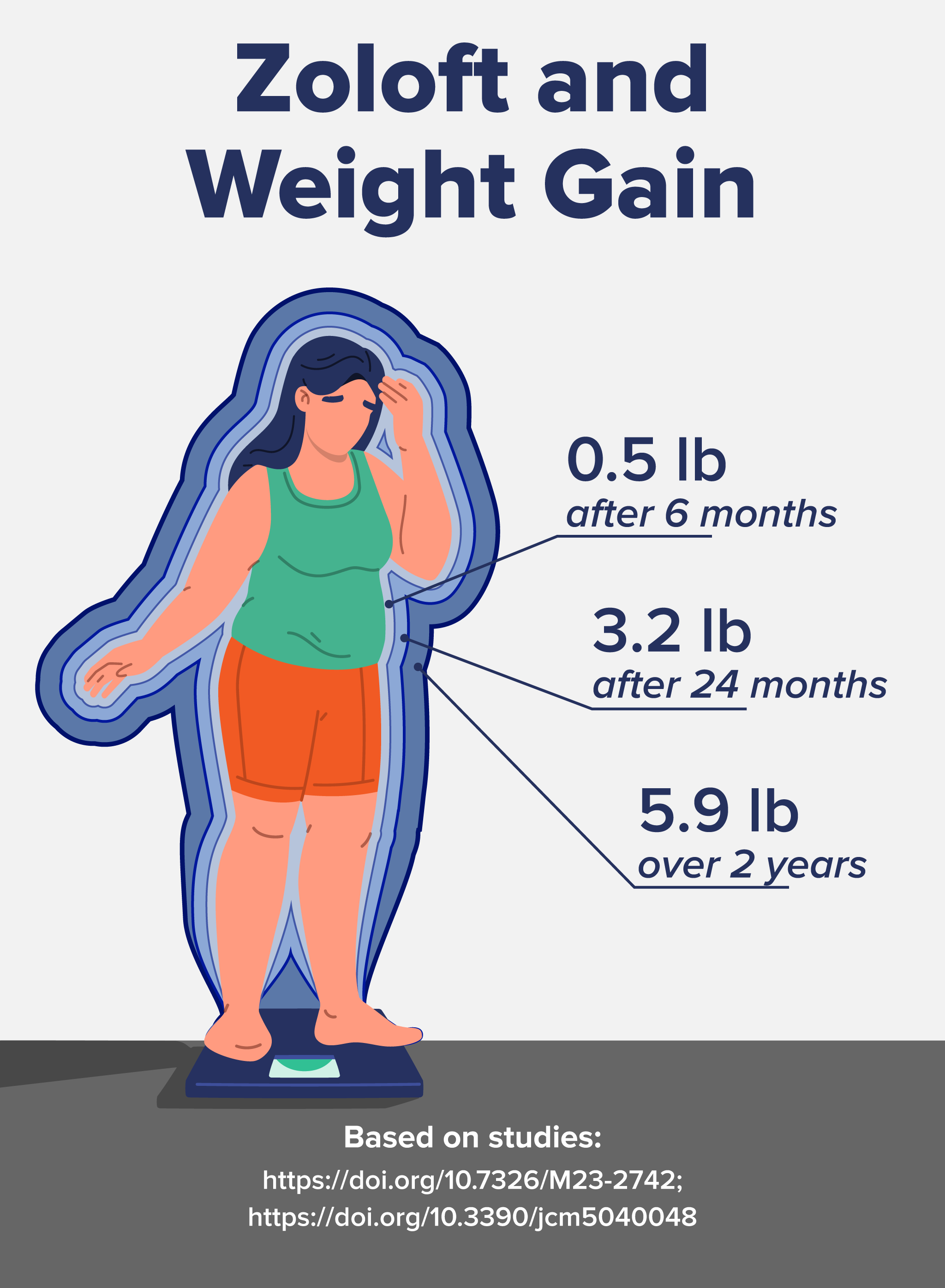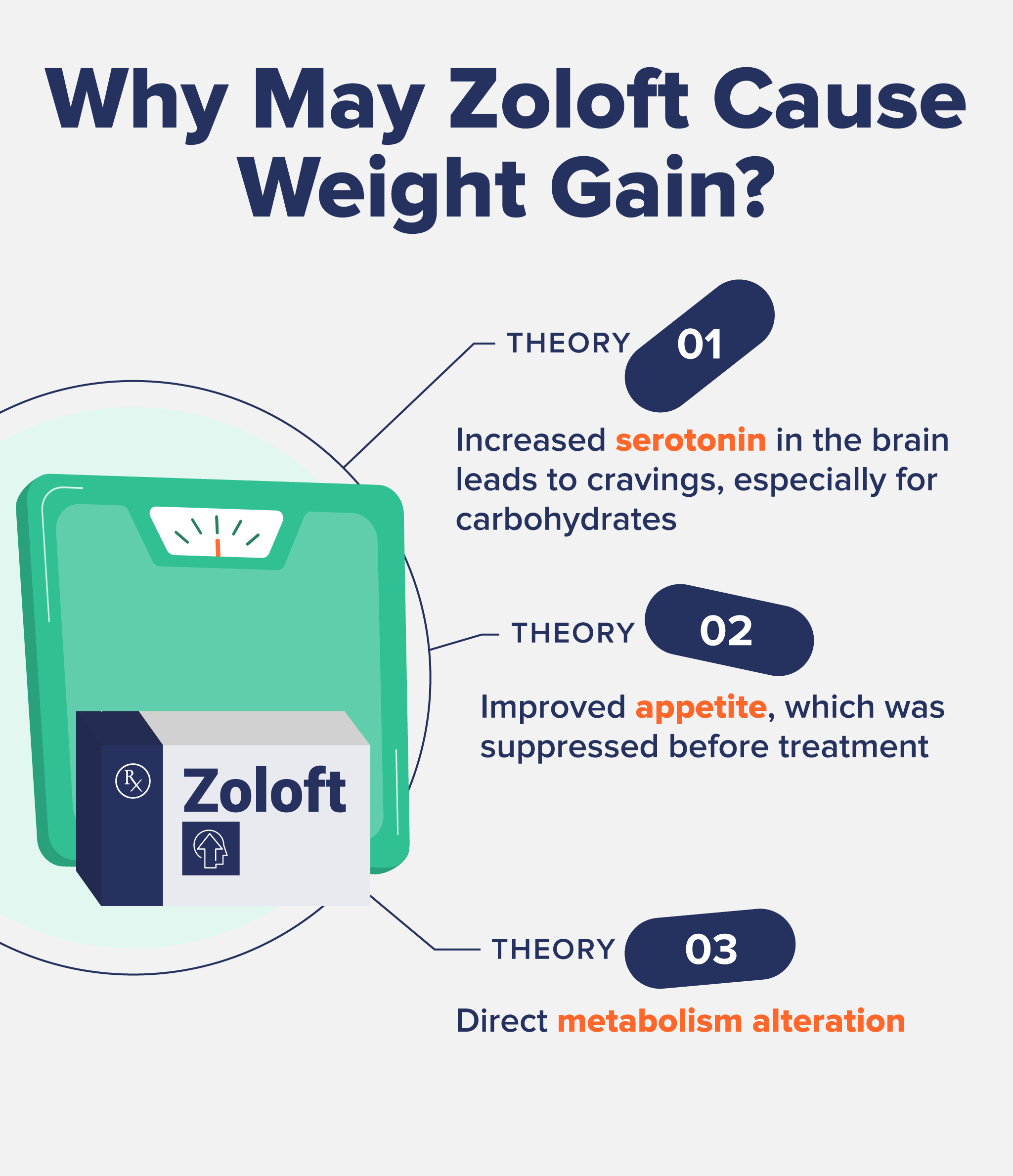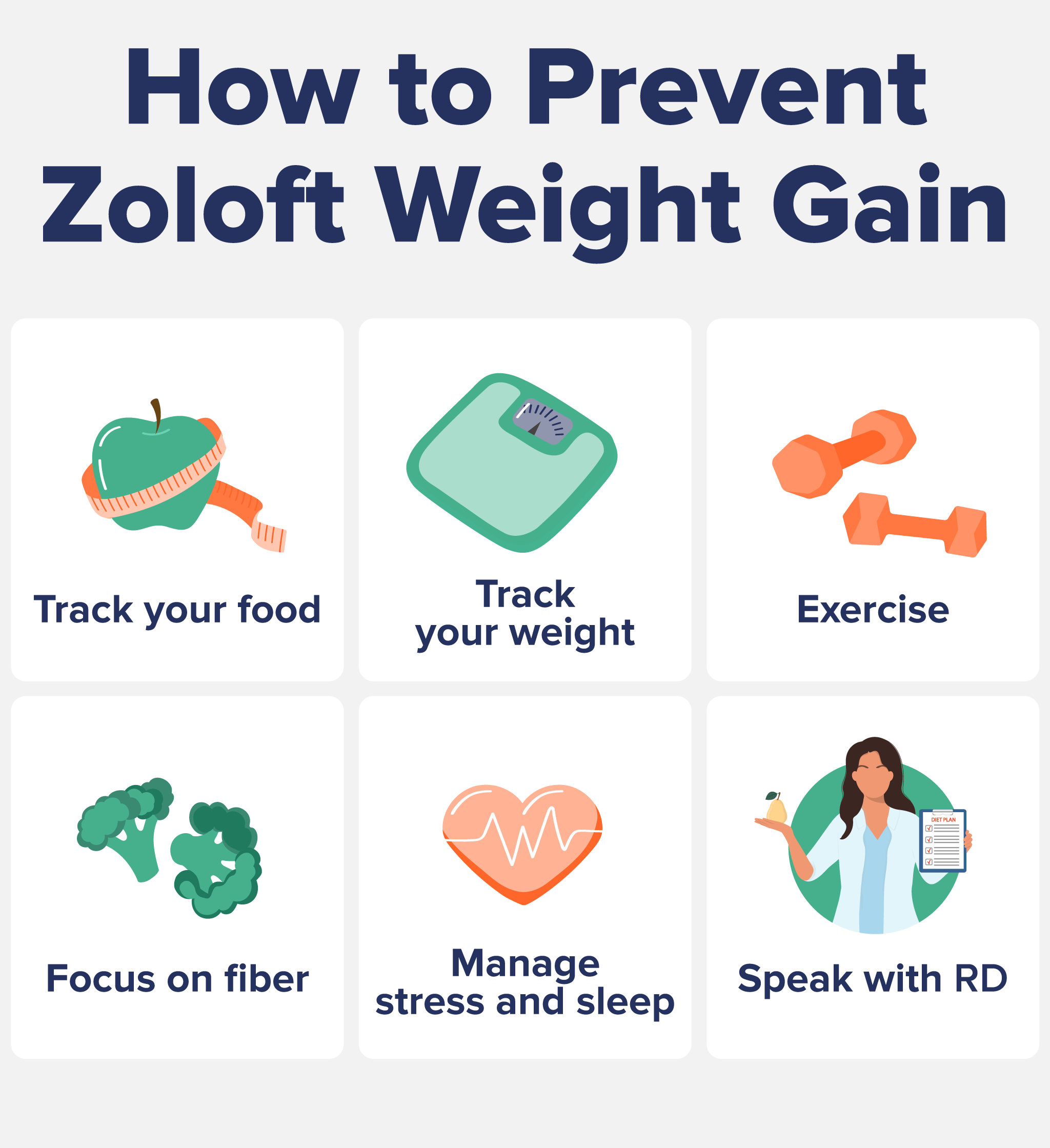Does Zoloft Cause Weight Gain? And Tips to Prevent It
Evidence Based Research To fulfill our commitment to bringing our audience accurate and insightful content, our expert writers and medical reviewers rely on carefully curated research.
Read Our Editorial Policy
Zoloft is a widely prescribed antidepressant that helps millions manage their mental health conditions, but many people also experience an unwanted side effect: weight gain.
While Zoloft can be life-changing, weight gain while on it can be frustrating, impacting self-esteem, body image, and confidence. Ironically, this can cause a vicious cycle of mental health challenges—the very thing Zoloft is meant to treat.
So, why exactly does Zoloft cause weight gain, and can you do anything to prevent it? In this article, learn more about Zoloft and weight gain, including how working with a Registered Dietitian might help you find a better balance.
How Does Zoloft Work?
Also known as sertraline, Zoloft is prescribed for conditions like major depressive disorder, OCD, panic disorder, PTSD, PMDD (premenstrual dysphoric disorder), and social anxiety disorder.
Zoloft is a medication known as an SSRI (selective serotonin reuptake inhibitor), meaning it blocks the reabsorption (or “reuptake”) of serotonin in the brain.1 This leads to higher levels of serotonin—our so-called “happy” or “feel-good” neurotransmitter—being available between nerve cells.
By increasing serotonin availability, SSRIs like Zoloft help regulate mood, which can relieve symptoms of depression and anxiety.
Common side effects include nausea, dizziness, sweating, and low libido. More rarely, Zoloft may cause severe reactions like serotonin syndrome—a potentially life-threatening condition that includes symptoms such as agitation, fever, rapid heartbeat, and muscle stiffness.
Lose the Guesswork
Start losing weight with a science-backed calorie & macro plan, built for your life.
Lose the Guesswork
Start losing weight with a science-backed calorie & macro plan, built for your life.

Does Zoloft Cause Weight Gain?
Some research—and numerous anecdotes—have suggested that Zoloft is associated with increased weight gain.
A BMJ study that followed over 53,000 people for ten years found those on antidepressants—Zoloft included—had a significantly higher risk of gaining weight, especially in years two and three of treatment.2
In year two, the risk of gaining more than 5% of body weight was 46.3% higher in those on antidepressants compared to a control group.
When the researchers broke it down by medication, Zoloft was linked to a 20% increased risk of gaining more than 5% of body weight.

Other studies have shown that:
- Zoloft users gained an average of 0.5 pounds after 6 months3
- Weight gain increased to 3.2 pounds after 24 months3
- Zoloft was linked to an average 5.9-pound gain over two years, more than with other SSRIs4
On average, research indicates that a moderate weight gain of 1 to 5 pounds is common while taking Zoloft. However, it can vary widely due to genetics, dosage, duration, and lifestyle choices, with some people not gaining any weight and others gaining more than 5 pounds.
Why Does Zoloft Cause Weight Gain?
But what’s actually behind the link between Zoloft and weight gain? There are some theories as to why some people are affected.
First, altering serotonin receptor activity and increasing serotonin in the brain may increase cravings, especially for carbohydrates.

Second, many people with depression or mental health disorders experience a suppressed appetite, which can improve once treatment begins. Eating more as your mood stabilizes is a sign of recovery, but it can also lead to weight changes.
A third theory is that SSRIs slightly alter metabolism in certain people, contributing to weight gain.
That said, not everyone with depression has a reduced appetite—some people may experience emotional eating or increased cravings during depressive episodes, which stabilize when mood does.
How to Prevent Zoloft Weight Gain
If you are concerned about gaining weight on Zoloft, remember that your mental health is much more important than a number on the scale. However, there are some ways to prevent Zoloft weight gain that aren’t restrictive or unsustainable.

One important note is that you should never stop taking Zoloft (or any SSRI) cold turkey—even if you are concerned about weight gain. You must consult your doctor first.
Some tips for weight management on Zoloft include:
- Track your food: There are many ways to track your food, including using apps (like one of these), jotting down notes on your phone, or keeping a loose record on a piece of paper. You don’t need to track every calorie (unless that helps you), but being generally aware of the food you consume can help with weight management. If you have a history of disordered eating, it’s best not to use this approach.
- Track your weight: Weighing yourself once a week can help you spot trends early and make adjustments before the scale creeps up too much. However, if you tend to obsess over the number, skip the scale and use non-scale victories instead—like how your clothes fit, your energy levels, or how you feel in your body.
- Exercise: Starting an exercise program that combines cardiovascular or aerobic activity, such as walking, jogging, or swimming, with strength training can be beneficial for both weight management and mental health.
- Focus on fiber: Fibrous foods (like fruits, vegetables, beans, legumes, seeds, and whole grains) help keep you more satiated and balance blood sugar, which can reduce sugar cravings. Fiber is also known to help with weight management.5
- Manage stress and sleep: Chronic stress and poor sleep can increase hunger hormones and cravings, especially for high-calorie, high-fat, and high-sugar foods. Aim for 7–9 hours of sleep each night, and incorporate stress-relief practices like mindfulness, meditation, stretching, or deep breathing.
Speak with a Registered Dietitian: No two cases of weight gain are the same, and a Registered Dietitian (RD/RDN) is a qualified nutrition expert who can help you make a plan that’s personalized for you.
Key Takeaways
Zoloft may cause mild to moderate weight gain, especially with long-term use. The reasons include shifts in appetite, cravings, metabolic changes, and the natural effects of feeling better and eating more.
That said, everyone responds differently—some people lose weight, while others gain none or much more.
Healthy habits, such as being aware of your food intake, exercising regularly, consuming enough fiber, and managing stress, can help you maintain your weight.
If you need help with weight management while taking Zoloft, consider consulting a Registered Dietitian to create a personalized plan that works for you. If you’re struggling to feel comfortable in your body, an RD can help you find a sustainable balance that doesn’t sacrifice your mental health—and remember to never stop taking Zoloft (or any antidepressant) without talking to your doctor first.
- Singh HK, Saadabadi A. Sertraline. [Updated 2023 Feb 13]. In: StatPearls [Internet]. Treasure Island (FL): StatPearls Publishing; 2025 Jan-. Available from: https://www.ncbi.nlm.nih.gov/books/NBK547689/
- Gafoor, R., Booth, H. P., & Gulliford, M. C. (2018). Antidepressant utilisation and incidence of weight gain during 10 years’ follow-up: population-based cohort study. BMJ (Clinical research ed.), 361, k1951. https://doi.org/10.1136/bmj.k1951
- Petimar, J., Young, J. G., Yu, H., Rifas-Shiman, S. L., Daley, M. F., Heerman, W. J., Janicke, D. M., Jones, W. S., Lewis, K. H., Lin, P. D., Prentice, C., Merriman, J. W., Toh, S., & Block, J. P. (2024). Medication-Induced Weight Change Across Common Antidepressant Treatments: A Target Trial Emulation Study. Annals of internal medicine, 177(8), 993–1003. https://doi.org/10.7326/M23-2742
- Arterburn, D., Sofer, T., Boudreau, D. M., Bogart, A., Westbrook, E. O., Theis, M. K., Simon, G., & Haneuse, S. (2016). Long-Term Weight Change after Initiating Second-Generation Antidepressants. Journal of Clinical Medicine 5(4), 48. https://doi.org/10.3390/jcm5040048
- Miketinas, D. C., Bray, G. A., Beyl, R. A., Ryan, D. H., Sacks, F. M., & Champagne, C. M. (2019). Fiber Intake Predicts Weight Loss and Dietary Adherence in Adults Consuming Calorie-Restricted Diets: The POUNDS Lost (Preventing Overweight Using Novel Dietary Strategies) Study. The Journal of Nutrition, 149(10), 1742–1748. https://doi.org/10.1093/jn/nxz117








